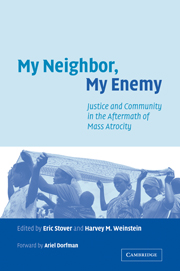Book contents
- Frontmatter
- Contents
- List of contributors
- Foreword by Ariel Dorfman
- Acknowledgments
- Introduction: conflict, justice and reclamation
- Part I Institutional approaches to justice
- Part II Social reconstruction and justice
- 7 Neighbors again? Intercommunity relations after ethnic cleansing
- 8 Memory, identity, and community in Rwanda
- 9 Attitudes toward justice and social reconstruction in Bosnia and Herzegovina and Croatia
- 10 Connecting justice to human experience: attitudes toward accountability and reconciliation in Rwanda
- 11 Public education and social reconstruction in Bosnia and Herzegovina and Croatia
- 12 Confronting the past in Rwandan schools
- Part III Survivors and justice
- Conclusion: a common objective, a universe of alternatives
- Index
11 - Public education and social reconstruction in Bosnia and Herzegovina and Croatia
Published online by Cambridge University Press: 05 May 2010
- Frontmatter
- Contents
- List of contributors
- Foreword by Ariel Dorfman
- Acknowledgments
- Introduction: conflict, justice and reclamation
- Part I Institutional approaches to justice
- Part II Social reconstruction and justice
- 7 Neighbors again? Intercommunity relations after ethnic cleansing
- 8 Memory, identity, and community in Rwanda
- 9 Attitudes toward justice and social reconstruction in Bosnia and Herzegovina and Croatia
- 10 Connecting justice to human experience: attitudes toward accountability and reconciliation in Rwanda
- 11 Public education and social reconstruction in Bosnia and Herzegovina and Croatia
- 12 Confronting the past in Rwandan schools
- Part III Survivors and justice
- Conclusion: a common objective, a universe of alternatives
- Index
Summary
Throughout history, governments of all political stripes have used history and literature curricula to reinforce national ideologies and identities. The promulgation of official memory through the school system can be an effective form of propaganda. The educational setting can become a conduit for the government or leaders' views, presenting political ideas and beliefs as either “correct” or “incorrect.” Textbooks and curricula can be used to justify or deny past state crimes, create revisionist history, present on-going injustices as natural, or perpetuate attitudes that replicate the conditions under which injustices are committed. Where school systems remain segregated and unequal, education can be manipulated to perpetuate inequalities that are a legacy of past conflicts, dispossession, or repression.
If public education can function to inflame hatreds, mobilize for war, and teach acceptance of injustice, it can be used also as a powerful tool for the cultivation of peace, democratic change, and respect for others. This premise has been a prominent focus of the United Nations (UN) Office of the High Representative (OHR) in Bosnia and Herzegovina (BiH), as well as numerous non-governmental organizations (NGOs) throughout the Balkans and in conflict zones around the world. If children living in divided societies can come together in the schools, this contact can be used to help them question the prejudices and stereotypes in their surrounding environment.
Information
- Type
- Chapter
- Information
- My Neighbor, My EnemyJustice and Community in the Aftermath of Mass Atrocity, pp. 226 - 247Publisher: Cambridge University PressPrint publication year: 2004
Accessibility standard: Unknown
Why this information is here
This section outlines the accessibility features of this content - including support for screen readers, full keyboard navigation and high-contrast display options. This may not be relevant for you.Accessibility Information
- 9
- Cited by
